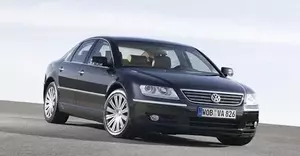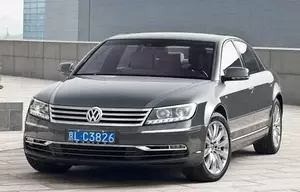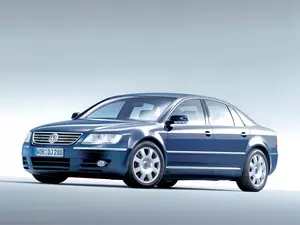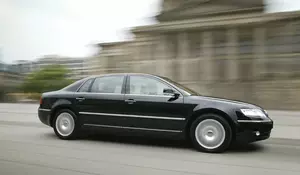
| Vehicle | Curb weight | Difference from world's smallest | Weight to power ratio | 0—60 mph acceleration ratio | Consumption ratio |
|---|---|---|---|---|---|
| 3.0 V6 TDI |
2313 kg / 5100 lbs |
1888 kg (4163 lbs) heavier | 10 kg to 1 hp | 282 kg/s (622 lbs/s) |
272 kg/L (600 lbs/L) |
| 3.6 V6 |
2251 kg / 4963 lbs |
1826 kg (4026 lbs) heavier | 8 kg to 1 hp | 265 kg/s (584 lbs/s) |
197 kg/L (434 lbs/L) |
| 4.2 V8 |
2273 kg / 5012 lbs |
1848 kg (4075 lbs) heavier | 7 kg to 1 hp | 344 kg/s (759 lbs/s) |
182 kg/L (401 lbs/L) |
| 6.0 W12 |
2433 kg / 5365 lbs |
2008 kg (4428 lbs) heavier | 5 kg to 1 hp | 419 kg/s (924 lbs/s) |
168 kg/L (370 lbs/L) |
| Vehicle | 3.0 V6 TDI |
|---|---|
| Curb weight |
2313 kg / 5100 lbs |
| Difference from world's smallest | 1888 kg (1888 lbs) heavier |
| Weight to power ratio | 10 kg to 1 hp |
| 0—60 mph acceleration ratio | 282 kg/s (622 lbs/s) |
| Consumption ratio |
272 kg/L (600 lbs/L) |
| Vehicle | 3.6 V6 |
| Curb weight |
2251 kg / 4963 lbs |
| Difference from world's smallest | 1826 kg (1826 lbs) heavier |
| Weight to power ratio | 8 kg to 1 hp |
| 0—60 mph acceleration ratio | 265 kg/s (584 lbs/s) |
| Consumption ratio |
197 kg/L (434 lbs/L) |
| Vehicle | 4.2 V8 |
| Curb weight |
2273 kg / 5012 lbs |
| Difference from world's smallest | 1848 kg (1848 lbs) heavier |
| Weight to power ratio | 7 kg to 1 hp |
| 0—60 mph acceleration ratio | 344 kg/s (759 lbs/s) |
| Consumption ratio |
182 kg/L (401 lbs/L) |
| Vehicle | 6.0 W12 |
| Curb weight |
2433 kg / 5365 lbs |
| Difference from world's smallest | 2008 kg (2008 lbs) heavier |
| Weight to power ratio | 5 kg to 1 hp |
| 0—60 mph acceleration ratio | 419 kg/s (924 lbs/s) |
| Consumption ratio |
168 kg/L (370 lbs/L) |

| Vehicle | Curb weight | Difference from world's smallest | Weight to power ratio | 0—60 mph acceleration ratio | Consumption ratio |
|---|---|---|---|---|---|
| 6.0 W12 |
2392 kg / 5274 lbs |
1967 kg (4337 lbs) heavier | 5 kg to 1 hp | 412 kg/s (908 lbs/s) |
165 kg/L (364 lbs/L) |
| 3.0 V6 TDI |
2261 kg / 4986 lbs |
1836 kg (4049 lbs) heavier | 9 kg to 1 hp | 286 kg/s (631 lbs/s) |
266 kg/L (587 lbs/L) |
| 4.2 V8 |
2182 kg / 4811 lbs |
1757 kg (3874 lbs) heavier | 7 kg to 1 hp | 331 kg/s (730 lbs/s) |
175 kg/L (386 lbs/L) |
| 3.6 V6 |
2154 kg / 4750 lbs |
1729 kg (3813 lbs) heavier | 8 kg to 1 hp | 263 kg/s (580 lbs/s) |
189 kg/L (417 lbs/L) |
| Vehicle | 6.0 W12 |
|---|---|
| Curb weight |
2392 kg / 5274 lbs |
| Difference from world's smallest | 1967 kg (1967 lbs) heavier |
| Weight to power ratio | 5 kg to 1 hp |
| 0—60 mph acceleration ratio | 412 kg/s (908 lbs/s) |
| Consumption ratio |
165 kg/L (364 lbs/L) |
| Vehicle | 3.0 V6 TDI |
| Curb weight |
2261 kg / 4986 lbs |
| Difference from world's smallest | 1836 kg (1836 lbs) heavier |
| Weight to power ratio | 9 kg to 1 hp |
| 0—60 mph acceleration ratio | 286 kg/s (631 lbs/s) |
| Consumption ratio |
266 kg/L (587 lbs/L) |
| Vehicle | 4.2 V8 |
| Curb weight |
2182 kg / 4811 lbs |
| Difference from world's smallest | 1757 kg (1757 lbs) heavier |
| Weight to power ratio | 7 kg to 1 hp |
| 0—60 mph acceleration ratio | 331 kg/s (730 lbs/s) |
| Consumption ratio |
175 kg/L (386 lbs/L) |
| Vehicle | 3.6 V6 |
| Curb weight |
2154 kg / 4750 lbs |
| Difference from world's smallest | 1729 kg (1729 lbs) heavier |
| Weight to power ratio | 8 kg to 1 hp |
| 0—60 mph acceleration ratio | 263 kg/s (580 lbs/s) |
| Consumption ratio |
189 kg/L (417 lbs/L) |

| Vehicle | Curb weight | Difference from world's smallest | Weight to power ratio | 0—60 mph acceleration ratio | Consumption ratio |
|---|---|---|---|---|---|
| 4.2 i V8 40V |
2205 kg / 4862 lbs |
1780 kg (3925 lbs) heavier | 7 kg to 1 hp | 334 kg/s (736 lbs/s) |
170 kg/L (375 lbs/L) |
| 3.2 V6 |
1995 kg / 4399 lbs |
1570 kg (3462 lbs) heavier | 8 kg to 1 hp | 229 kg/s (505 lbs/s) |
165 kg/L (364 lbs/L) |
| 3.0 TDI |
2255 kg / 4972 lbs |
1830 kg (4035 lbs) heavier | 10 kg to 1 hp | 268 kg/s (591 lbs/s) | - |
| 4.9 V10 TDI |
2462 kg / 5429 lbs |
2037 kg (4492 lbs) heavier | 8 kg to 1 hp | 373 kg/s (822 lbs/s) |
216 kg/L (476 lbs/L) |
| 6.0 W12 48V |
2300 kg / 5072 lbs |
1875 kg (4135 lbs) heavier | 5 kg to 1 hp | 397 kg/s (875 lbs/s) |
159 kg/L (351 lbs/L) |
| Vehicle | 4.2 i V8 40V |
|---|---|
| Curb weight |
2205 kg / 4862 lbs |
| Difference from world's smallest | 1780 kg (1780 lbs) heavier |
| Weight to power ratio | 7 kg to 1 hp |
| 0—60 mph acceleration ratio | 334 kg/s (736 lbs/s) |
| Consumption ratio |
170 kg/L (375 lbs/L) |
| Vehicle | 3.2 V6 |
| Curb weight |
1995 kg / 4399 lbs |
| Difference from world's smallest | 1570 kg (1570 lbs) heavier |
| Weight to power ratio | 8 kg to 1 hp |
| 0—60 mph acceleration ratio | 229 kg/s (505 lbs/s) |
| Consumption ratio |
165 kg/L (364 lbs/L) |
| Vehicle | 3.0 TDI |
| Curb weight |
2255 kg / 4972 lbs |
| Difference from world's smallest | 1830 kg (1830 lbs) heavier |
| Weight to power ratio | 10 kg to 1 hp |
| 0—60 mph acceleration ratio | 268 kg/s (591 lbs/s) |
| Consumption ratio | - |
| Vehicle | 4.9 V10 TDI |
| Curb weight |
2462 kg / 5429 lbs |
| Difference from world's smallest | 2037 kg (2037 lbs) heavier |
| Weight to power ratio | 8 kg to 1 hp |
| 0—60 mph acceleration ratio | 373 kg/s (822 lbs/s) |
| Consumption ratio |
216 kg/L (476 lbs/L) |
| Vehicle | 6.0 W12 48V |
| Curb weight |
2300 kg / 5072 lbs |
| Difference from world's smallest | 1875 kg (1875 lbs) heavier |
| Weight to power ratio | 5 kg to 1 hp |
| 0—60 mph acceleration ratio | 397 kg/s (875 lbs/s) |
| Consumption ratio |
159 kg/L (351 lbs/L) |

| Vehicle | Curb weight | Difference from world's smallest | Weight to power ratio | 0—60 mph acceleration ratio | Consumption ratio |
|---|---|---|---|---|---|
| 3.2 V6 |
2390 kg / 5270 lbs |
1965 kg (4333 lbs) heavier | 10 kg to 1 hp | 281 kg/s (620 lbs/s) |
204 kg/L (450 lbs/L) |
| 5.0 V10 TDI |
2462 kg / 5429 lbs |
2037 kg (4492 lbs) heavier | 8 kg to 1 hp | 373 kg/s (822 lbs/s) |
216 kg/L (476 lbs/L) |
| 4.2 V8 |
2390 kg / 5270 lbs |
1965 kg (4333 lbs) heavier | 7 kg to 1 hp | 362 kg/s (798 lbs/s) |
184 kg/L (406 lbs/L) |
| 6.0 W12 |
2390 kg / 5270 lbs |
1965 kg (4333 lbs) heavier | 5 kg to 1 hp | 412 kg/s (908 lbs/s) |
165 kg/L (364 lbs/L) |
| Vehicle | 3.2 V6 |
|---|---|
| Curb weight |
2390 kg / 5270 lbs |
| Difference from world's smallest | 1965 kg (1965 lbs) heavier |
| Weight to power ratio | 10 kg to 1 hp |
| 0—60 mph acceleration ratio | 281 kg/s (620 lbs/s) |
| Consumption ratio |
204 kg/L (450 lbs/L) |
| Vehicle | 5.0 V10 TDI |
| Curb weight |
2462 kg / 5429 lbs |
| Difference from world's smallest | 2037 kg (2037 lbs) heavier |
| Weight to power ratio | 8 kg to 1 hp |
| 0—60 mph acceleration ratio | 373 kg/s (822 lbs/s) |
| Consumption ratio |
216 kg/L (476 lbs/L) |
| Vehicle | 4.2 V8 |
| Curb weight |
2390 kg / 5270 lbs |
| Difference from world's smallest | 1965 kg (1965 lbs) heavier |
| Weight to power ratio | 7 kg to 1 hp |
| 0—60 mph acceleration ratio | 362 kg/s (798 lbs/s) |
| Consumption ratio |
184 kg/L (406 lbs/L) |
| Vehicle | 6.0 W12 |
| Curb weight |
2390 kg / 5270 lbs |
| Difference from world's smallest | 1965 kg (1965 lbs) heavier |
| Weight to power ratio | 5 kg to 1 hp |
| 0—60 mph acceleration ratio | 412 kg/s (908 lbs/s) |
| Consumption ratio |
165 kg/L (364 lbs/L) |